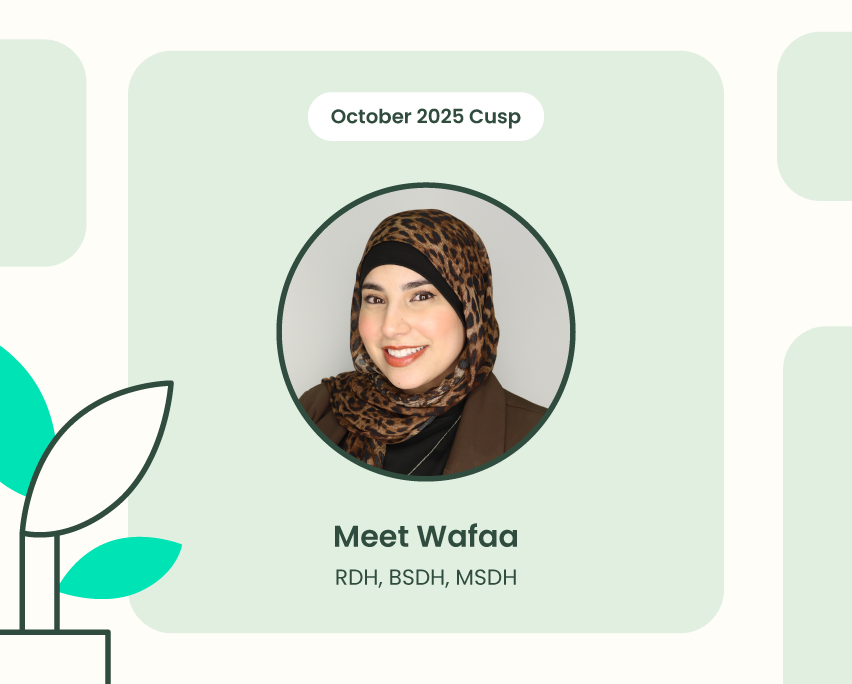
Wafaa, RDH, BSDH, MSDH
Share
Wafaa is a clinician, mentor, and advocate who brings visibility and inclusivity to dentistry. As the first in her family to earn both a bachelor’s and master’s degree in dental hygiene, she knows the power of education and representation. In this spotlight, she shares how advanced training, cultural awareness, and mentorship can empower providers and build stronger patient connections.
quip: You’re the first in your family to graduate with both a bachelor’s and master’s degree in dental hygiene and from the University of Michigan School of Dentistry, no less. What did that milestone mean to you, and how has it shaped the way you mentor or inspire others in the profession?
Wafaa: Being the first in my family to earn both a bachelor’s and a master’s degree in dental hygiene at the University of Michigan was huge for me. It showed me what’s possible when you work hard and have the right support. That experience made me very aware of how intimidating school and career decisions can be, especially for people breaking new ground. So when I mentor students or new hygienists, I try to be approachable, encouraging, and to share my own story so they see that advanced education and leadership roles are within reach. My goal is always to help them feel empowered and confident in their path.
quip: As one of the few hijab-wearing clinicians in the U.S., you bring representation patients don’t often see in dentistry. How has that visibility helped you connect and what challenges has it brought that others might not realize?
Wafaa: Wearing the hijab in a dental setting has actually been a bridge for me. Many patients—especially women or people from underrepresented backgrounds—have told me they feel more comfortable or seen when they walk into the operatory. It can spark meaningful conversations about culture and health, and it reminds patients that dentistry is for everyone. At the same time, there are challenges others might not realize, like being aware of stereotypes or having to continually prove your professionalism to those who may not be familiar with seeing a hijab-wearing clinician. But those experiences have strengthened my empathy and my commitment to building trust and inclusivity with every patient.
quip: Many hygienists stop at a bachelor’s, but you pursued a master’s as well. What drove you to go further, and how has that advanced training changed the way you practice and advocate for patients?
Wafaa: What motivated me to pursue a master’s after my bachelor’s was really a desire to deepen my knowledge and have a greater impact—both for my patients and the profession. The advanced training taught me to think more critically, integrate evidence-based practices, and consider patient care from a broader perspective. It also gave me tools to advocate more effectively for patient education and oral health equity. In practice, I’m more intentional about personalized care and empowering patients with the information they need to make informed decisions about their oral health. The master’s degree also widens my horizons in terms of career growth, specifically in allowing me access to the world of teaching. I hope to become a professor in a hygiene program and help shape the skills and minds of eager hygiene students.
quip: You’re licensed in both Michigan and Illinois. What was the process like for holding multiple state licenses, and do you find it challenging to maintain them?
Wafaa: Getting licensed in both Michigan and Illinois was definitely a process. It required an understanding of the specific requirements of each state, from exams to continuing education, and doing all the work needed to pass each state board exam. Maintaining both licenses does require staying on top of CE credits and deadlines, and application fees. Overall, it’s rewarding because it gives me flexibility and a broader perspective on dental hygiene practice, including the ability to work in both states.
quip: Many clinicians are looking for ways to bring more inclusivity and cultural awareness into their practices but aren’t sure where to start. What’s one practical step you’d encourage dental professionals to take today?
Wafaa: One practical step I’d suggest is really listening to your patients and asking questions about their preferences, values, and cultural needs. Even something as simple as asking how a patient prefers to be addressed or learning a bit about their background can go a long way toward making them feel respected and understood. Small changes in communication and awareness can have a big impact on building trust and creating an inclusive environment.
quip: When it comes to at-home care, what’s one quip product you genuinely love using, and how do you see tools like that helping patients stay consistent with their routines?
Wafaa: One product I genuinely love is the quip Rev Oscillating Toothbrush. I use it myself every day and notice how much more effective it is at removing plaque compared to a manual brush. I share that experience with patients because personal use helps make recommendations relatable. Tools like this can really improve consistency—when patients enjoy using a product and see results, they’re more likely to stick with their routine and take ownership of their oral health.